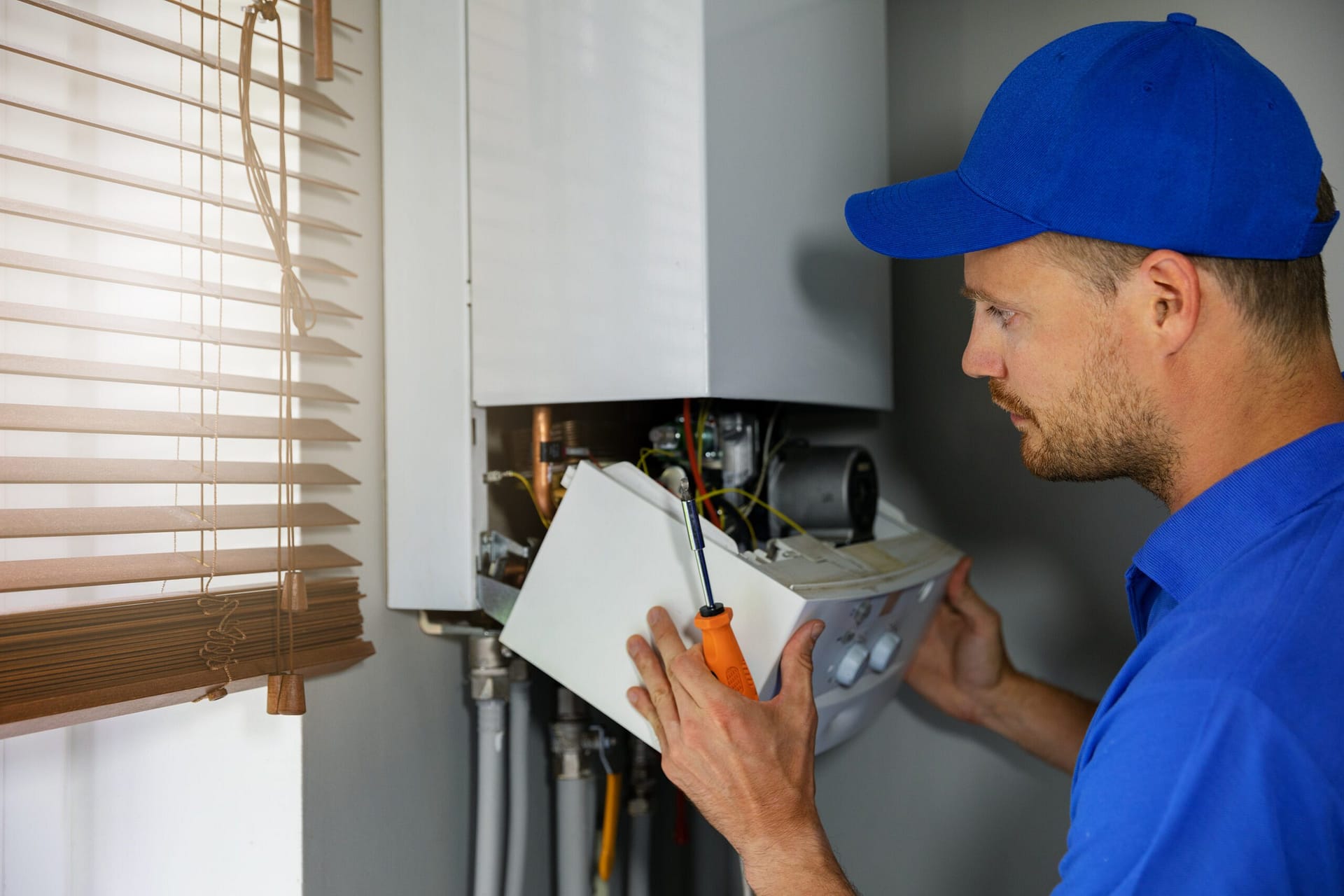When the winter months come around there’s nothing you want less than a malfunctioning heating system. While it’s easy to put it on the backburner during the warmer weather, when that snow storm hits you want it working in peak condition. That’s why it’s vital to keep on top of your residential boiler maintenance routine throughout the year. A yearly maintenance cycle, with tasks carried out in each season will keep even old residential boilers working over for years to come.
Understanding Your Boiler
At their most simple, a boiler does exactly what it sounds like- it heats water to near boiling which is then pumped around your home to supply radiators and keep things nice and cozy.
There are nuances between types of boiler system that a homeowner should be aware of:
- Conventional Boilers: also known as a “traditional boiler” this style of system has been around for a very long time. A tank of cold water, usually located in your loft space, feeds a boiler tank before being pumped around your system.
- System Boilers: work in much the same way as a conventional boiler but draw their water directly from the mains rather than a bulky storage tank, making them a good choice for homes without an attic.
- Combi Boilers: while these are still relatively uncommon in the US, they are quickly gaining traction. They supply hot water for both heating and domestic use. Their two main advantages over the more common system and conventional boilers are that they supply hot water on demand and are far more compact.
Regardless of which style of system is in your home, it’s always a good idea to know which make, model and the basic specifications of your boiler. Not only does this mean that regular residential boiler maintenance will be easier but it means you can find the right help when something goes wrong.
The Importance of Preventative Maintenance
Keeping on top of your yearly boiler maintenance can go a long way to helping you avoid franticly googling “how do you service a boiler” in the winter months.
Not only does it help stave off disasters like an old residential boiler breaking down at the least opportune time, keeping up on servicing means that you will have lower bills thanks to improved efficiency and can avoid a costly replacement.
There are also the safety aspects to consider, especially if your system is gas powered. Getting a gas safety check each year as part of your residential boiler maintenance checks is never a bad idea.
This annual cycle of heating system maintenance can also pay dividends over the lifespan of your heating system by keeping warranties valid and expanding the working life of your boiler.
The alternative means running the risk of catastrophic failure just when you need your boiler most, increased utilities costs and having to rip out and replace your heating sooner than you might need to otherwise.
Residential Boiler Maintenance Check List
Regardless of the time of year, there’s something that you should be considering about your heating system. While the temptation to delay work until the nights get longer and the days get colder is always there, it’s never a good idea to delay these checks and tasks.
Here’s our seasonal residential boiler maintenance checklist:
Fall (pre-heating)
When the leaves start to change color it’s time to start thinking about keeping warm for winter. These autumnal checks will ensure that your system is ready and waiting for when you need it most.
1. Inspect and clean boiler components:
First things first, your boiler likely hasn’t been used much over the last few months (unless you use it to heat domestic water too). It’s a good idea to give it a once over and ensure that everything seems to be in working order.
2. Check for leaks and corrosion:
During your inspection, check along as much of the system as you can for signs of corrosion and any leaks. Particularly pay attention around any joints or connections in pipe work. The last thing you want is to turn on the system and find water flowing from your radiators.
3. Test the thermostat and pressure relief valve:
Regardless of which fuel your residential boiler uses it probably makes up the largest part of your utilities bill each winter. Making sure that the thermostat is in good working order will ensure you’re not either running the system more than necessary or paying above the odds for more than you need.
While you’re there, making sure the pressure relief valve is working can avoid a problem becoming a disaster too.
4. Bleed radiators to remove trapped air:
If you switch on your heating and find that your radiators aren’t warming up evenly, especially if they feel cold at the top, you’ve likely got trapped air in there. Using a radiator key, you can open them up and allow the air to be forced out. This will ensure that your system is working at peak efficiency.
5. Schedule a professional inspection and servicing:
Of course, it’s always a good idea to have an expert cast an eye over your heating system before you really need it too. A professional servicing can head off any problems before they become an issue.
Winter (Heating Season)
Your boiler will be doing most of its work as the winter rolls around so the colder months are no time to slack off with your heating system maintenance routine.
1. Monitor boiler pressure and water levels:
If you find you’re having to re-pressurize or refill your system regularly, it’s indicative that something is wrong somewhere and needs fixing. Not only is it possible that you’ve got a leak, it’s going to be costing you more thanks to reduced efficiency.
2. Check for unusual noises or smells:
strange noises and smells coming from your boiler and heating system can be a sign that sludge is building up in the system or that your heating element or tank is becoming corroded. As impurities from the water supply build up in your tanks and pipes or start to coat your element they reduce the efficiency of your heating system and cost you more to run.
3. Ensure all vents and flues are clear of obstruction:
If you’re burning fuel (either oil or gas) it’s important that the fumes produced can be vented safely away. Make sure that there are no blockages or obstructions which might reduce the flow of gases leaving the system. Not only do these present a serious health risk if they can’t escape, it will make your system less efficient too.
4. Keep an eye on fuel supplies:
It goes without saying that even the most efficient, best maintained residential boiler can’t run without fuel. If you’ve got an oil fired or tanked gas system, keeping an eye on how much fuel you have and keeping it topped up is without a doubt the single most important thing you can do for it.
Spring (Post-Heating Season)
After the winter starts to pass there are a few tasks you should be completing to ensure that next winter goes without a hitch.
1. Cleaning:
being in near constant use in the winter will leave residues. Performing a thorough cleaning now will make avoiding nasty build ups later much easier.
2. Check and reset the system:
as the days start to warm up, you’re unlikely to need the heating on all the time. This is the perfect time to adjust your settings and make sure everything is in proper working order.
3. Check the expansion tank:
the expansion tank allows your boiler to remain at a stable pressure while it heats the water and as it cools down again while not in use. Usually you want the pressure here to be at 1 bar.
4. Schedule a service:
this is always a good idea but it’s especially important if you noticed any odd behavior from your boiler during the “on” season. Things like odd smells, strange sounds or fluctuating pressure and heat need to be investigated now.
Summer (Off Season)
1. Turn off the boiler:
If you’ve got a separate heating and hot water system, there’s not much point on keeping the boiler running when it’s not needed. If you do have a combi-system then this isn’t an option but your boiler won’t be wasting energy to power your heating anyway.
2. Keep the area around your boiler clear and ventilated:
keeping on top of cleaning and avoiding anything blocking up flues is a good idea all year round.If nothing else, it makes the busier times of year that little bit easier.
3. Plan for any repairs and replacements:
Summer offers the perfect opportunity to get any big jobs done while the system isn’t in use.
When To Call a Professional
There are certain tasks that just can’t be done by anyone but a professional. It’s vital to schedule an annual inspection to ensure that everything is in working order and, most importantly, safe.
It’s also vital that you bring in an expert when you notice serious issues with your boiler: no heating, leaks or strange noises and smells all require professional investigation.
With a proper routine of maintenance, your residential boiler can keep you cozy for many winters to come.

